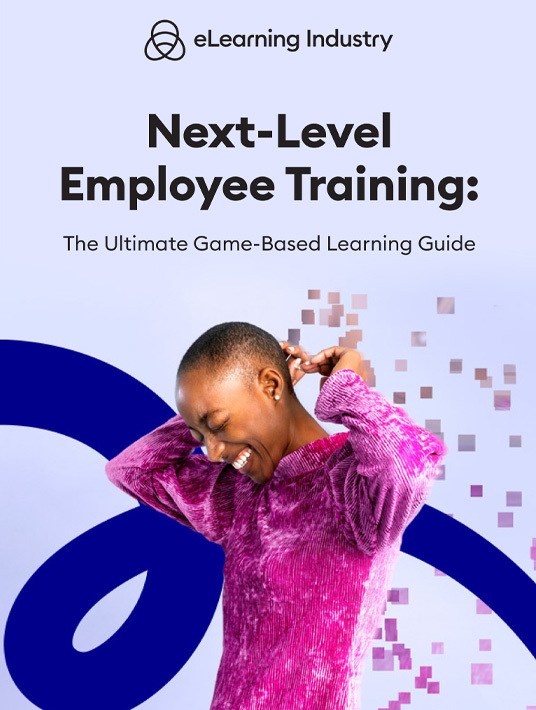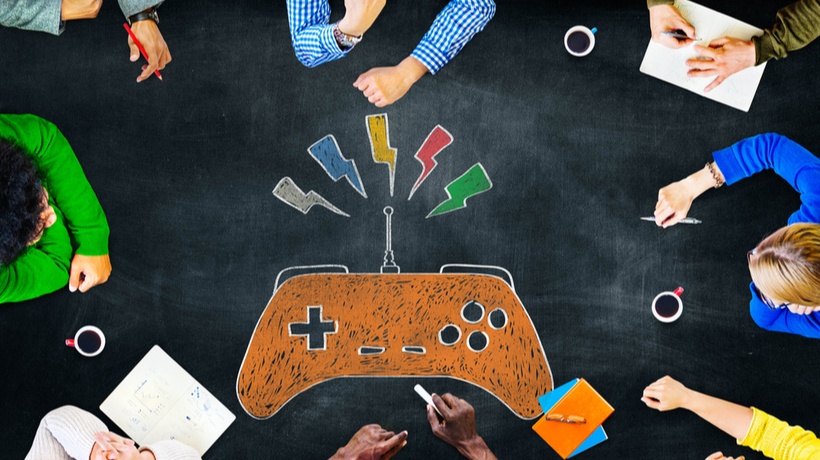The Pros Of Gamification Design In Your Employees’ Development Training
Staffers expect ongoing training and support from your organization. But they know it usually comes in the form of boring, bland, and/or lengthy ILT sessions. Game-based learning gives you the opportunity to blow those preconceptions out of the water. Levels, engaging characters, and realistic challenges facilitate mistake-driven learning for every member of the team. They can also take calculated risks without worrying about real-world repercussions, as well as emotionally connect with the training materials to improve their understanding. If you’re still wondering whether GBL is right for your employee development training, consider these 6 perks.

6 Top Advantages Of Employee Development Training Games
1. Improves Trainee Engagement
Employee engagement is one of the biggest obstacles for L&D teams. How do you get them hooked and hold their attention, especially when there are so many distractions standing in the way? Game-based learning immerses them in the situation and introduces them to captivating characters. They can experience the challenge instead of just reading about it. And it’s all framed by interactive levels, dialogue, and objects. Thus, they’re more likely to assimilate the info because they’re involved in the training process. Finally, games are a lot more fun than an hour-long presentation about safety gear or dress code.
2. Encourages Mistakes And Risk-Taking
Most employees are too afraid to take risks even if they know it leads to personal growth. It’s because of the negative repercussions that come with their choices or actions. However, game-based learning enables them to make mistakes in a safe setting. They still get to experience all the stressors and emotions that come with on-the-job challenges. But every error helps them improve performance and adjust their approach. They also get to see how their choices impact others and spark a chain of events. For instance, they lash out at a coworker instead of trying to reason with them, which causes workplace conflict and hinders collaboration. Maybe they need to work on their interpersonal skills to avoid the same mistake in the real world.
3. Improves Knowledge Retention
There are so many work tasks and pressures swimming around in employees’ minds that training is last on the list. Even if they do carve out time for a course, internal distractors are a force to be reckoned with. Thankfully, game-based learning helps keep their eyes on the prize. They retain more information because it’s a kinesthetic experience that requires their active participation. It also involves memorable characters, problems, and settings that make their brains take notice. That said, you need to make things easy on their mental schema. Try to stick with one skill, task, or topic to prevent cognitive overwhelm. You should also keep audio/visual stimuli to a minimum. For example, background music must blend into the surroundings and evoke emotion. Keep video clips short for mobile users. And try not to cram multiple characters into every scene.
4. Enhances Immersion And Interactivity
For the most part, employees expect a passive training experience. For example, they have to sit and listen to a half-hour lecture or watch a video. It’s simply a matter of memorizing as much information as possible…and trying not to nod off. On the other hand, training games are immersive, interactive, and learner-centered. They must participate to achieve the outcomes, such as choosing which path they want to venture down based on past experience or picking the right question in the dialogue box. Even the act of dragging and dropping objects makes the gaming experience more tactile and personalized.
5. Reinforces Favorable Performance Behaviors
You can’t force employees to change or improve their work practices. However, you can give them a gentle nudge and encourage them to disclose their own areas for improvement. That’s the beauty of eLearning gamification design. Center on behaviors or skills they need to build on the job so that employees are able to evaluate their own practices as well as see how all their training know-how applies in the workplace. For instance, the game begins with a brief demo clip of the task. Then trainees use that knowledge to perform the steps and complete the sale. They explore the right and wrong way to follow company policy or why it’s so crucial to develop related skills. At its core, game-based learning is about experiential knowledge.
6. Improves Online Training ROI
Your accounting team is probably looking at the financial perks of training games. So, they’ll be pleased to know that game-based learning also improves your ROI. Employee engagement, better retention, and fewer mistakes on the job mean a healthier bottom line. You get more from your investment because employees get more from the training experience. It caters to different preferences and styles. Plus, everyone has the opportunity to go at their own pace and focus on personal pain points. It may require new authoring tools and more payroll hours. But gamification design has the power to completely transform your current training program.
Conclusion
Should you invest in training games? Honing in-house talent is crucial for the success of your business. They’re your most valuable asset. And game-based learning makes training enjoyable and engaging; at least as enjoyable as mandatory compliance topics can be. After all, you’re not a miracle worker. GBL encourages employees to take risks and learn from them, as well as improve performance behaviors that hurt your bottom line and brand image. They also allow staff members to interact with their environment and experience challenges firsthand, which builds their self-confidence so that they’re ready to take on any task and step in for absent peers.
Choose an eLearning content provider who knows their way around gamification design. You can use our online directory to find the right vendor for your game-based learning course. There are even reviews and ratings to help you make a sound investment.
Download our eBook Next-Level Employee Training: The Ultimate Game-Based Learning Guide to target specific goals, challenges, and key takeaways with a GBL strategy.









